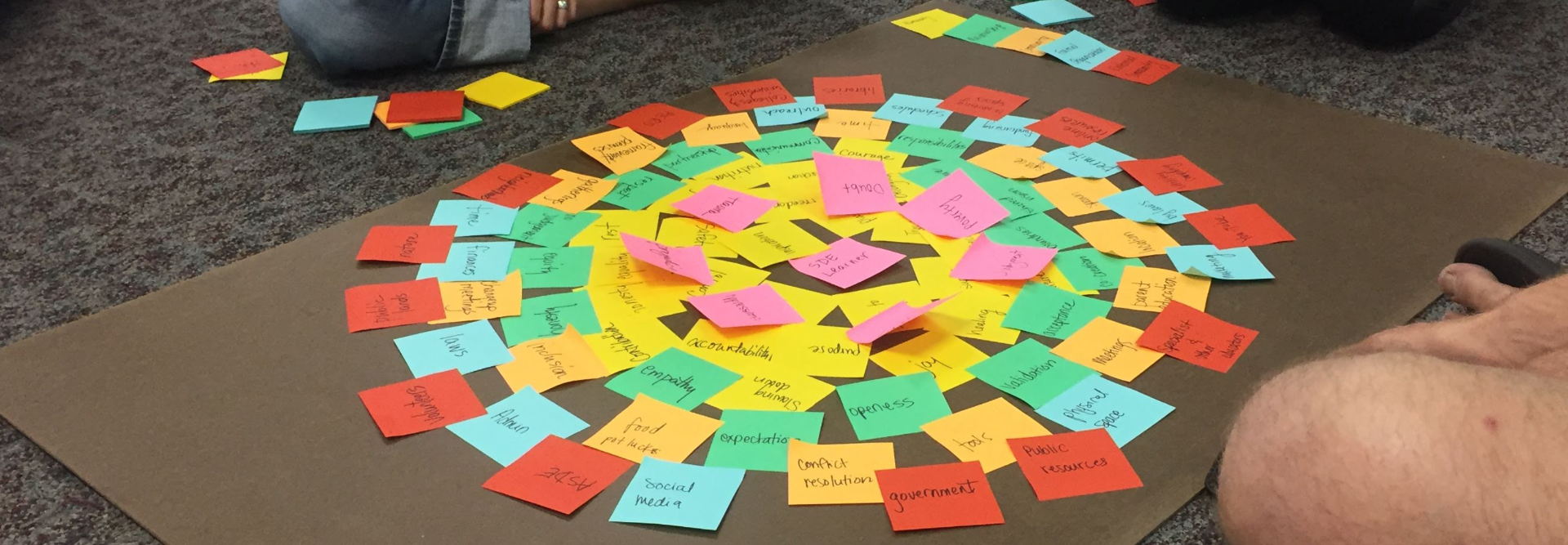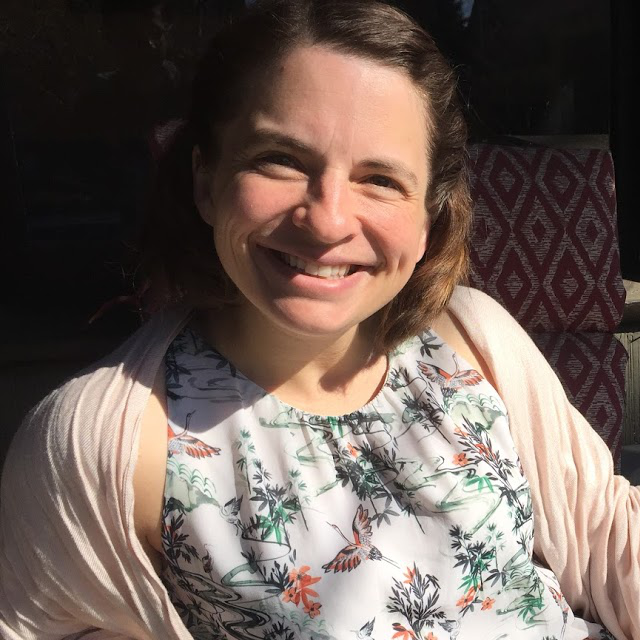Several years ago when we moved to Portland, OR, I had the privilege of attending an Agile Learning Facilitator (ALF) Training Workshop (I believe it was called) which was one of the most impactful experiences of my life to that point. It was a place where I could put into practice all the reading and conversations I have had until that point. At the workshop, we were encouraged to take care of our bodies (move if we needed to, sit or stand where we wanted to, and leave for food or the bathroom if we needed to). It was also a place where we made agreements together (not just the presenters telling everyone else what to do). People were able to advocate for themselves. I remember one person adding to the list that they didn’t want to be interrupted when they were talking, which then became, “Let’s not interrupt each other because everyone wants a chance to feel heard.” But the main thing that stood out to me was my simultaneous feelings of yes, all meetings should be like this! and my underlying discomfort with the fact that I had gotten so good at repressing my needs at any given moment that I wasn’t even sure what I should ask for. I didn’t know who my authentic self was anymore (I was whoever someone else needed me to be). That event and the people I surrounded myself with afterward have helped me become an active participant in untangling schoolishness (or school’s ideals and people-pleasing) from myself and my own values. It is an ever-evolving continuation of my deschooling journey.
Before any of these realizations, I used to perceive people who were able to advocate for themselves and their needs as a threat. I used to think of them as “not playing the game.” I realized later that I was jealous. From my perception, they were free in ways I never thought I could be. They seemed to be doing whatever they wished, dancing in the streets with abandon, not caring what most people thought of them, and saying no to things I only wished I could. And sometimes, I was made to believe they were rude, selfish, and didn’t care about me or the community.
“The game,” in my mind, was to act the way society and schools deemed acceptable, which I was under the impression we had all agreed to play.
My perception of the rules was simple, everyone just denied their own needs and did what the “authorities” said no matter what. And yet, here were these people not playing by those rules. Ah, there’s the threat, my schoolish mind thought. Ridicule them. Make them feel separate and wrong. Deny that you also want that. Make it so you don’t have to face the uncomfortable angry feelings that surface when coming to terms with the fact that you might not have had to sacrifice your own needs for all these years.
And there it was, the crux of the whole issue. The fear that maybe I had it wrong this whole time. That maybe I didn’t actually have to deny my own needs either. That maybe the “shoulds” put on me by society and school weren’t actually mine. Yet, I still wasn’t at a point where I could accept that truth, because I didn’t have enough knowledge, time, space, self-awareness, resources, tools, you-name-it to actually consider what changing that limiting belief might look like and so denying it became my default defense mechanism and a way for me to function day-to-day.
Another aspect I want to mention briefly here is that society and schools use us to police each other in exchange for acceptance in the group. And if someone doesn’t fit in (at school or in society), they are either ridiculed, manipulated, coerced to conform, or they are kicked out. When I didn’t know anyone else or enough people living this lifestyle, there wasn’t any perceived safety net of community. I had to search out others before I could fully consider changing that belief.
But once that idea was planted at the ALC Training, it started to shape me. I moved, in subtle ways, toward the subconscious hope that maybe it was true. I started talking to people about it, working on it in my mind, in my sleep, reading about it, and searching for others who had a similar experience. Slowly, the old belief of, “That’s great for you, but it could never work for me,” started to crumble and a new belief began to take its place. A belief that said, “Maybe that can be for me, too.”
As I worked toward gathering capacity, tools, resources, therapy, community, and knowledge, slowly, I was simultaneously tearing down that once-useful defense mechanism, rebuilding the no-longer-true image of who I always thought I was based on school’s ideals, and disconnecting my worth as a human being from what I did or didn’t do and when I did or didn’t conform.
When I was a young person in conventional school, I was used to hierarchy, complying with the “authorities” without question, internalizing the misguided idea that my value was tied to my productivity and obedience, feeling unable to set boundaries with adults (though they could set them with me), and either suppressing my emotions or turning my anger and frustrations onto others (who weren’t the source of my anger, but who felt safer for me to turn my anger on than toward the source).
I remember several times when I was a teen helping out with younger kids and I had this moment where they were messing around and I couldn’t handle it, so I yelled at them to stop and they did. Oh, that feeling of “power” and “authority” was so exhilarating. I didn’t have control in my own life for so long and then finally, I could control another person. They listened to me, “respected” me (respect is in quotes because that’s what it felt like at the time, but now I realize they feared me and what punishments they would get if they didn’t listen to me). Even though it felt like it met my need for being listened to, on some level, I knew there was something off about it (that it was still using power, threats, and fear of punishment as a way of relating to others).
And, if I’m being honest, part of me had a hard time taking accountability for acting out my frustrations on others, because I think deep down I didn’t feel I had any other choices (I could only react).
Staying steeped in that type of environment for so long, after a while I believed I couldn’t get out, that it was the only way, and I told myself I was ok with it. That I was doing fine. That this is all there is for me. And when I met people who were homeschooled, my internal conformist had me ridiculing how they acted behind their backs as a way of both securing my belonging with my conventional-schooled friends and confirming that we didn’t want to act like that, right? Right?! I had to squash any hopes of wanting something different for myself because I didn’t have enough support, resources or capacity to change, so my defense mechanism stayed firmly in place. Deny. Deny. Deny.
That day at the ALC Training, when I saw people modeling a different way of being, I couldn’t deny what I wanted any longer. My new set of beliefs, which took hold and started forming and will continue to be ever-evolving, are:
- That the process is the point, not a final product or destination (no matter how much I just want to check it off my to-do list and be done).
- That I, myself, and other human beings have value just by existing. That I can try my best to honor the humanity in the people around me every day.
- That I won’t always get it right, and that’s ok. I am worthy of the same forgiveness I extend to others.
- That as I work to discover my needs again, it’s ok to advocate for them and for myself. My needs matter because I matter. And knowing when to push and when to hold back is a dance I’m practicing everyday.
- That I don’t have to look to the “authorities” and instead I can learn to trust the authority and wisdom in myself. It hasn’t been easy, but it’s definitely worth it.
My new set of beliefs is working to rewrite the old, limiting beliefs about myself and the world that I internalized in school. I’m working to accept myself where I am in my journey, even when I wish it wasn’t so hard or that I was farther along. And I’m working on having compassion for other humans because I believe we’re all just trying to do the best we can with the support and resources we have (or don’t have... yet).
And while I wish I hadn’t denied my needs for so long, after a lot of self-reflection, conversations with others, support, perspective, learning about behavioral psychology and conditioning (and much more), I am now starting to understand why I did.
If you enjoyed this article and feel called to give back to ASDE, here are ways you can support our work:
- Donate money
- Share our content with others! Click one of the buttons above to easily share on Twitter, Facebook, or email.
- Consider becoming a Contributor for Tipping Points
Tipping Points Magazine amplifies the diverse voices within the Self-Directed Education movement. The views expressed in our content belong solely to the author(s). The Alliance for Self-Directed Education disclaims responsibility for any interpretation or application of the information provided. Engage in dialogue by reaching out to the author(s) directly.






